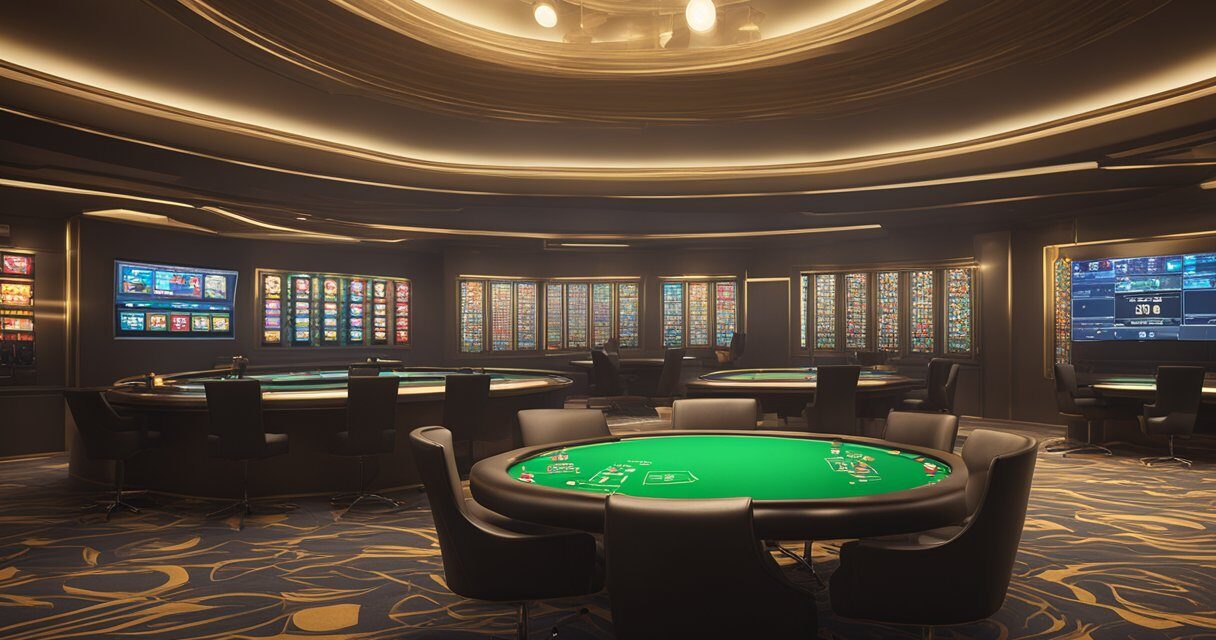The United Arab Emirates (UAE) has recently established a new regulatory body, the General Commercial Gambling Regulatory Authority (GCGRA), to supervise commercial gaming within the nation. This development marks a significant shift in the UAE’s approach to gambling operations, which includes both traditional gambling avenues and contemporary lotteries. The GCGRA is vested with the authority to regulate, monitor, and ensure the integrity and transparency of all gambling-related activities.

With the establishment of the GCGRA, the UAE aims to create a safe and controlled environment for those involved in gaming operations. The regulatory framework set forth by the GCGRA is designed to protect consumers, ensure fair play, and prevent illegal activities associated with gambling. Furthermore, by formalizing the gaming sector, it positions the country to better understand and mitigate any potential negative economic impacts, while also leveraging the potential for tourist growth and international collaborations.
Key Takeaways
- The UAE has formed the GCGRA to oversee gambling and lotteries.
- The GCGRA’s regulations prioritize consumer safety and fair play.
- The authority contributes to mitigating economic risks and enhancing tourism.
Establishment of GCGRA

The United Arab Emirates has taken a significant step in the gaming industry by initiating the General Commercial Gambling Regulatory Authority (GCGRA). This body is responsible for administering the emerging commercial gambling sector within the country.
Mandate and Purpose
The GCGRA has a clearly defined mandate to ensure that gambling activities are conducted in a fair, transparent, and responsible manner. It is tasked with safeguarding the integrity of commercial gambling by implementing and enforcing standards and regulations. The purpose of the GCGRA is to:
- Regulate and control the licensing process for gambling operators.
- Monitor compliance with gambling laws and regulations.
- Protect the interests of the players and stakeholders involved.
Legislative Framework
Legislation plays a critical role in the operations of the GCGRA. A robust legal framework has been established to support the authority’s functions and objectives. Key components of this framework include:
- Gambling Act: The primary legislation governing all forms of commercial gambling.
- Licencing Regulations: Specific guidelines that outline the licencing requirements for operators.
- Code of Conduct: A set of rules that dictate the ethical and operational standards for gambling establishments.
This legislative structure is instrumental in ensuring that the gambling environment in the UAE remains well-regulated and controlled.
Scope of Regulation

The United Arab Emirates has taken a structured approach to regulate the gaming industry through the establishment of the GCGRA. This ensures that all commercial gaming activities operate within a strict legal framework.
Gambling Oversight
The GCGRA mandates strict compliance with regulations for all gambling operations. They must adhere to policies that concern:
- Fair Play: Ensuring games are not rigged and provide equal chances to all participants.
- Consumer Protection: Implementing safeguards to protect consumer rights and prevent exploitation.
License issuance and renewals are contingent upon operators meeting these criteria. Regulatory audits ensure ongoing adherence.
Lottery Management
The Authority is responsible for supervising all lottery activities, which includes:
- Licensing: Only approved operators can conduct lotteries.
- Revenue Distribution: Clear guidelines dictate the allocation of lottery-generated funds.
These measures are in place to guarantee transparency and integrity in lottery operations.
GCGRA Organizational Structure

The General Commercial Gambling Regulatory Authority (GCGRA) is structured to ensure effective oversight and regulation of the commercial gaming sector in the UAE. Its organization is defined by a clear hierarchy and specialized departments working in conjunction to maintain industry standards.
Executive Leadership
At the pinnacle of the GCGRA’s organizational structure is the Board of Directors, presided over by a Chairperson appointed by the UAE government. They provide strategic direction and make high-level policy decisions. Directly supporting the Chairperson is the Chief Executive Officer (CEO), who oversees daily operations and implements the Board’s policies and strategies.
Administrative Hierarchy
The administrative hierarchy under the CEO comprises several key departments:
- Regulatory Affairs: Ensures compliance with gaming laws and regulations.
- Licensing Department: Manages the issuance and renewal of gaming licenses.
- Audit and Compliance: Monitors gaming operations for financial integrity and legal compliance.
- Responsible Gaming and Enforcement: Works to prevent and address problem gambling and enforce gaming regulations.
Each department is headed by a Director who reports to the CEO. They are tasked with operational management within their specific areas of responsibility, ensuring the GCGRA’s strategic objectives are met through day-to-day activities.
Regulatory Policies

The United Arab Emirates has taken a structured approach to regulate commercial gaming through the introduction of the General Commercial Gambling Regulatory Authority (GCGRA). The GCGRA’s regulatory framework is designed to ensure transparency, fairness, and responsible gaming within the nation’s borders.
Licensing Procedures
The GCGRA mandates that all entities seeking to offer gambling and lottery services obtain a valid license. The licensing process is rigorous and includes several key stages:
- Preliminary assessment: Applicants must submit comprehensive business plans and undergo financial stability checks.
- Background checks: Directors and key personnel are subject to criminal and financial background investigations.
- Technical Evaluation: The operational systems and software used by applicants are tested for compliance with technical standards.
- Public Interest Evaluation: Applications are reviewed to ensure proposed gaming activities align with the public interest and social responsibility measures.
Successful applicants are issued a license, which is subject to periodic review.
Compliance Standards
Entities operating under the GCGRA must adhere to strict compliance standards, including but not limited to:
- Responsible Gaming: Operators must have protocols in place to prevent and address problem gambling.
- Anti-Money Laundering (AML): Robust AML practices must be implemented to prevent financial crimes.
- Consumer Protection: It is imperative to ensure the fairness of games and the safeguarding of consumer data.
- Regular Audits: Regular audits are conducted to ensure continuous compliance with the prescribed regulatory framework.
Non-compliance with these standards can result in penalties, including fines, suspension, or revocation of licenses.
Gaming Operators in UAE

In the UAE, gaming operators are now under the oversight of the General Commercial Gambling Regulatory Authority (GCGRA). This agency ensures that all gambling activities are conducted in compliance with strict regulations.
Registration Requirements
To operate legally in the UAE, gaming operators must obtain a license from the GCGRA. Key requirements for licensure include:
- Corporate Structure: Operators must present a clear corporate structure with information on key shareholders and personnel.
- Financial Stability: Evidence of financial stability with audited financial statements is required.
- Background Checks: Comprehensive background checks are performed on all applicants to guard against any criminal affiliations.
Operational Guidelines
Once licensed, gaming operators in the UAE must adhere to stringent operational guidelines. These regulations encompass:
- Gaming Integrity: Games offered must be fair, transparent, and regularly audited by authorized third parties.
- Responsible Gaming: Operators must implement measures to promote responsible gambling and provide assistance for gambling addiction.
- Advertising Standards: All marketing activities are to be done responsibly, avoiding targeting of minors and presenting factual information.
Consumer Protection

The establishment of the General Commercial Gambling Regulatory Authority (GCGRA) in the UAE marks a significant step towards ensuring the safety and fairness of gambling activities for consumers. The regulatory framework focuses on upholding consumers’ rights and providing effective mechanisms for dispute resolution.
Rights and Responsibilities
Consumers engaging with UAE’s regulated gambling entities have the right to:
- Fair Play: Expectation of honest and transparent gaming experiences.
- Information: Access clear information regarding game rules, odds, and payouts.
- Privacy: Assurance that personal and financial data are securely handled.
These rights are complemented by consumer responsibilities, which include:
- Compliance: Adherence to the terms and conditions set by gaming operators.
- Awareness: Education on the risks associated with gambling.
- Self-Regulation: Utilizing tools provided for responsible gaming.
Dispute Resolution
The GCGRA has implemented a structured process for handling disputes:
- Initial Complaint: Consumers must first reach out to the operator to address the issue.
- Formal Filing: If unresolved, the consumer can file a complaint with the GCGRA.
The authority ensures:
- A timely response to disputes, aiming for resolution within a specified timeframe.
- An impartial assessment of each case, safeguarding consumer interests.
Economic Impact

The establishment of the General Commercial Gambling Regulatory Authority in the UAE has opened new economic avenues through controlled and regulated commercial gaming activities.
Revenue Generation
The General Commercial Gambling Regulatory Authority (GCGRA) introduces a formal framework to levy taxes and fees on gambling operations. Tax revenues from licensed casinos, sports betting, and lotteries are expected to contribute to the national treasury. For instance, a 5% tax on gross gaming revenue could yield substantial annual income, based on similar international benchmarks.
Market Growth
Regulated commercial gaming is anticipated to attract numerous global gaming enterprises, leading to an expansion of the UAE market. Initial estimates project a 20% year-over-year market growth rate in the initial five years following the GCGRA’s inception. Additionally, subsidiary industries, such as hospitality and tech services, will likely experience an increase in demand correlating with the rise of the gaming sector.
International Collaboration

The General Commercial Gambling Regulatory Authority (GCGRA) of the UAE is striving towards fostering global partnerships. These collaborations focus on ensuring international best practices in gambling regulation and adhering to anti-money laundering standards. The GCGRA works in tandem with counterpart regulatory bodies across various jurisdictions.
Key Partnerships and Agreements:
- Memoranda of Understanding (MoUs): These have been signed with established gaming regulators in Europe and Asia to exchange strategic information on gambling oversight.
- International Forums and Workshops: The GCGRA actively participates in global gaming conferences to stay abreast of industry trends and regulatory techniques.
- Joint Ventures: Collaborating with international law enforcement agencies to combat cross-border gambling-related crimes.
Ongoing Collaboration Efforts Include:
- Sharing of expertise and resources for more effective regulatory measures.
- Joint task forces focusing on combatting fraud and ensuring fair play.
- Development of uniform standards for gambling operations that align with international norms.
The GCGRA’s commitment to international engagement positions it as a responsible member of the global regulatory community, reinforcing the UAE’s reputation as a jurisdiction that upholds integrity in commercial gaming activities.
Monitoring and Enforcement

Effective regulatory oversight by the General Commercial Gambling Regulatory Authority (GCGRA) ensures compliance with gambling laws and maintenance of industry integrity. This section outlines the approaches and measures in surveillance systems and the imposition of penalties and sanctions.
Surveillance Systems
The GCGRA employs state-of-the-art surveillance technology to monitor gambling activities across various platforms. It includes:
- Real-time Monitoring: Continuous observation of gaming operations to ensure they follow established rules and regulations.
- Transaction Tracking: Detailed logging of all gaming transactions for anomaly detection and auditing purposes.
Penalties and Sanctions
The GCGRA has a structured framework for penalties and sanctions that serve as a deterrent against violations of gaming laws. Key components include:
- Tiered Penalty System: Fines, license suspensions, or revocations depending on the severity of the infraction.
- Legal Actions: Prosecution for serious offenses, aligning with UAE’s legal statutes.
Future Developments
The establishment of the General Commercial Gambling Regulatory Authority (GCGRA) in the UAE signals a strategic regulatory shift towards the commercial gaming sector. Moving forward, the GCGRA is expected to implement a comprehensive regulatory framework that ensures the integrity of gaming operations. Key future developments include:
- Licensing Procedures: A detailed licensing system will be developed, categorizing gaming activities and setting stringent criteria for operators.
- Casinos
- Online platforms
- Lottery vendors
- Player Protection Measures:
- Age verification: Guarantees to prevent underage gambling.
- Responsible gaming programs: Education and self-exclusion tools for players.
- Regulatory Oversight:
- Continuous monitoring of licensed entities.
- Anti-money laundering (AML) compliance checks.
- Regular audits and reporting requirements.
- Technology Integration: Embracing cutting-edge technology to:
- Enhance secure transaction mechanisms.
- Adopt digital identification methods.
- Utilize data analytics for risk management.
- Local Economy Impact: Job creation in the regulatory and operational aspects of commercial gaming.
The GCGRA will be expected to foster a responsible and thriving gaming environment that benefits both the economy and society at large. Its activities will be carried out with a strong emphasis on ethical practices and international collaboration to align with global regulatory standards.
Frequently Asked Questions
The GCGRA’s new regulatory framework has prompted questions regarding casino licensing, online gaming regulations, employment, and the organization’s impact on the gaming sector in the UAE.
How can one apply for a UAE casino license?
Applicants must approach the General Commercial Gambling Regulatory Authority to obtain a casino license in the UAE. The process involves rigorous background checks, compliance with financial regulations, and adherence to strict gaming operations standards.
What regulations have been put in place by the UAE for online gaming?
The UAE has established comprehensive regulations for online gaming that include ensuring fair play, protecting player data, and preventing money laundering. Operators are required to have robust security measures and operate in line with international gaming standards.
What are the employment opportunities within the General Commercial Gambling Regulatory Authority?
The GCGRA offers a variety of employment opportunities, from regulatory and compliance roles to positions focused on financial analysis and customer protection. These roles are critical in ensuring the integrity and transparency of the gambling sector.
How are gambling activities monitored by the GCGRA in the UAE?
Gambling activities are closely monitored by the GCGRA through continuous oversight, regular audits, and the use of advanced technology to track and analyze gaming operations. This ensures compliance with the law and protects the interests of all stakeholders.
What impact does the National lottery and Commercial Game Authority have on traditional and online gambling?
The establishment of the GCGRA has provided a structured framework that governs both traditional and online gambling. This has standardized industry practices, potentially attracting more players while ensuring responsible gaming.
What is the estimated number of gamers in the UAE and how does the market regulation affect them?
It is estimated that the number of gamers in the UAE is growing, with market regulation aiming to offer a safe and fair gaming environment. This encourages responsible gaming and helps maintain the sector’s economic viability.

























